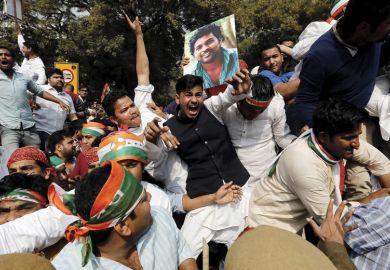Prakash Shah is a little unkind to South Asianists abroad who have to make a living in demanding conditions that implicitly and explicitly enjoin meek intellectual and political conformity (“The battle for the Indian mind”, Features, 5 May).
My own personal recollection as an academic was that to resist viewing India in what was in essence a Cold War paradigm was unwelcome and put one’s career in some jeopardy. By contrast, editorials could compare the Pakistani military dictator Zia ul Haq to Oliver Cromwell and warn India to seek approval for its conduct since Khalistan rhymed with Kurdistan. The late Benazir Bhutto was also compared to Israeli prime minister Golda Meir while Indian premier Indira Gandhi was berated in another editorial for her alleged “Brahminnical” (sic) arrogance.
Revisiting press clippings from an earlier era shows that the archetypal liberal Jawaharlal Nehru, now the mascot of the so-called liberal Indian elite, fared much worse than subsequent nationalist successors such as Indian prime minister Atal Bihari Vajpayee. The Cold War stamp on the perception of India could not be less ambiguous than in the particular hostility towards Nehru, who was determined to retain Indian autonomy on the world stage, while the supposedly nationalist Vajpayee, who sought to befriend the US, has been treated with much less venom.
Rohith Vemula’s death was most unfortunate, but he wasn’t a martyr and his anger towards the Left has been studiously ignored by these lofty academics that include international luminaries such as Charles Taylor. As for Kanhaiya Kumar, the less said about him the better since his ilk seek the dismantling of India, no doubt a Nato goal too that us lesser breeds will determinedly oppose. All of a piece really, and Indian social scientists abroad have written themselves out of the script by engaging in blatant fabrication and slander unlike any other national group of academics outside their own country.
gautam.sen2_298344
Via timeshighereducation.com
Send to
Letters should be sent to: THE.Letters@tesglobal.com
Letters for publication in Times Higher Education should arrive by 9am Monday.
View terms and conditions.
Register to continue
Why register?
- Registration is free and only takes a moment
- Once registered, you can read 3 articles a month
- Sign up for our newsletter
Subscribe
Or subscribe for unlimited access to:
- Unlimited access to news, views, insights & reviews
- Digital editions
- Digital access to THE’s university and college rankings analysis
Already registered or a current subscriber?
